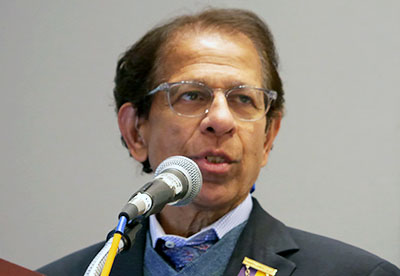
|
|||
 |
|||
Interventions That Promote Wisdom May Help Patients With Psychiatric Conditions
“My sense is that you will see the same things [as have been found in research on resilience and other positive traits]. That is, wisdom will be shown to be about 50 percent heritable and about 50 percent will be affected by the environment. And one’s behavior can have an impact on wisdom.” Jeste was joined at the symposium by Bruce Miller, M.D., of the University of California, San Francisco. His research on frontotemporal dementia (FTD), a degenerative disease of the brain’s frontal and temporal lobes, shows that specific circuits of the brain appear to be associated with empathy, prosocial instincts, and other aspects of wisdom that are lost in FTD. “Almost all of the neurodegenerative diseases begin with psychiatric problems, which I believe represent the prodrome [an early symptom] in neurodegenerative disease,” Miller said. “Mood and anxiety symptoms have been assumed to be responses to [dementia], but I believe they really reflect the underlying biology of the neurodegenerative illness. “We can get a window into the circuits that are dysfunctional and begin to understand how these symptoms [associated with loss of wisdom] are driven by loss of function in specific brain regions,” he said. “We think it begins in very specific neurons and spreads out along microcircuits affecting the entire prefrontal cortex.” Ellen Lee, M.D., a geriatric mental health research fellow in the department of psychiatry at UCSD, presented evidence indicating that wisdom is modifiable and can be enhanced by certain focused interventions. She cited an article by Jeste published online last year entitled “You Can Actually Learn to Be Wise and It Can Help You Feel Less Lonely.” “We believe that wisdom is moderately heritable but that about 45 percent to 50 percent is influenced by environmental factors,” Lee said. Lee reported her analysis of 55 randomized, control trials of interventions aimed at various components of wisdom: 27 studies examining interventions for prosocial behaviors, 13 studies focusing on emotional regulation, and 15 studies aimed at encouraging spirituality. She described a “self-compassion” intervention for people who binge eat that employed an online slide presentation about self-compassion, guided self-imagery exercises, and a daily homework schedule that includes writing a self-compassion letter to oneself and managing urges to eat through visualization of self-compassion. Compared with a behavioral intervention that prescribed a food schedule, the self-compassion intervention improved overall measures of self-compassion and modulated some of the behaviors related to binge eating. A second intervention Lee described involved using computer games to teach emotional regulation strategies to children aged 8 to 10 years old with autism spectrum disorder. Parent-rated outcome measures indicated that the intervention significantly improved emotional regulation and social behavior. And a third example Lee described was a spirituality intervention for patients on methadone maintenance to prevent risk behaviors associated with HIV/AIDS. It included eight weekly sessions in either group or individual sessions using cognitive-behavioral therapy based on Buddhist principles of doing no harm in speech or action. Lee said the intervention significantly increased daily spiritual practice and decreased HIV-related behavior. “Based on our overall review of the literature I believe we can enhance wisdom, with some caveats,” Lee said. “We want to explore further the inverse relationship between loneliness and wisdom and try to understand the biological and psychosocial variables associated with wisdom and how it relates to physical well-being.” (Image: Mark Moran) |
|
Copyright © 2019 American Psychiatric Association. All rights reserved.
